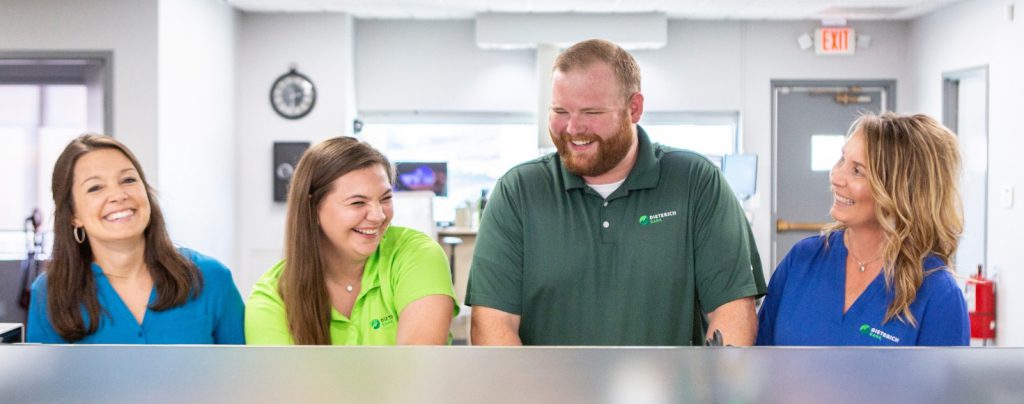Consistent with predictions that check fraud will result in $12.5 billion or more in financial losses this year, many businesses and other organizations are seeking additional protection from this growing form of financial fraud. Positive Pay, a service designed to safeguard the integrity of financial transactions by preventing check fraud and other unauthorized transactions, is now available to business owners through Dieterich Bank’s Online Banking for Businesses.
In this article, we explain Positive Pay, how it works, its growing importance for businesses, and how you can start implementing this robust security tool for your organization today.
What is Positive Pay?
Designed as a tool to detect and prevent fraudulent or unauthorized transactions from being processed against a business’s account, Positive Pay offers a straightforward solution: businesses provide their bank with a list of authorized checks that have been issued (including details such as check numbers, account numbers, payees, and check amounts) for later comparison to the information on a check being cashed. This type of early warning system empowers financial institutions and businesses to identify counterfeit, altered, and forged checks before they are cleared.
Understanding the Threat
Advances in technology have allowed criminals to create more convincing counterfeit checks in recent years. Combined with innovative methods of breaching check clearing processes, including schemes that allow foreign criminal networks to recruit people in the U.S. for the purposes of cashing checks, check fraud is an ongoing focus of criminal activity despite continued growth in digital payments.
Some common types of check fraud schemes include:
- Counterfeit Checks: Positive Pay detects fraudulent checks created with account and routing numbers copied from a legitimate check. Check numbers, payee names, and other data points will not match the details appearing on counterfeit checks.
- Forged Signatures: Criminal forgeries of authorized signatures from stolen checks are detected by Positive Pay due to mismatched data points like payee name.
- Altered Payee Name: A common criminal scheme involves stealing a check and altering the payee’s name. With Positive Pay, altered payee name data is flagged for additional attention prior to clearance.
- Changed Check Amounts: Positive Pay detects attempts to alter the written or encoded check amount to a higher amount, ensuring that only the authorized amount is paid out.
- Reused Checks: If a check has been reported as lost or stolen, Positive Pay stops any attempt to cash that check if it is presented for clearance.
- Duplicate Checks: Positive Pay catches duplicate check numbers, blocking their clearance and thwarting attempts to copy checks and double deposit them.

Fortifying your Business Finances
Positive Pay is a powerful tool for enhanced financial security that swiftly detects and prevents possible fraud, shields businesses from liability, strengthens an organization’s reputation, and more:
- Fraud Detection and Prevention: Positive Pay identifies discrepancies and irregularities in details on a presented check and that of a business’s authorized list, providing both the business and financial provider with increased control over the check clearing process.
- Timely Notification and Resolution: Positive Pay promptly notifies a business owner or representative when a discrepancy in check information is detected. With real-time alerts, a business can act swiftly to verify the authenticity of the check and take appropriate measures.
- Account Protection: Without Positive Pay, unauthorized checks and ACH transactions may be posted against your account, lowering your balance and requiring your assistance for remediation. With the implementation of Positive Pay, the unauthorized checks can be stopped before posting to your account and affecting your balance.
- Reporting Tools: Positive Pay provides insight into check issuance activity with several important reports relating to check activity, including:
- Exception Reports that indicate checks that do not match the Positive Pay file
- Issued Reports that list all checks issued by the business
- Compliance with Regulatory Standards: The adoption of Positive Pay allows businesses to demonstrate their commitment to regulatory compliance relating to financial controls and fraud prevention and can contribute to both a reduced risk of penalties and strengthened confidence in the business or organization and its operations.
- Enhanced Reputation and Trust: By actively prioritizing financial security, businesses help develop and strengthen their reputation while also building trust with important stakeholders, including customers, suppliers, and partners.

Positive Pay Complements Other Defenses Against Fraud
Positive Pay is most effective when complemented by other best practices that help reduce the frequency and severity of check fraud. Consider the following ideas when developing a comprehensive defense against check fraud for your business or organization:
- Safe Storage: Store blank check stock in a secure, locked location with limited access. Only authorized personnel should have access to blank checks.
- Audits: Conduct regular audits and inventory checks of blank check stock to detect any missing or unaccounted checks and investigate any discrepancies.
- Check Numbering: Use pre-numbered check stock and account for all check numbers used. Avoid using checks out of sequence.
- Check Printing: Be careful with check printing and handling to avoid leaving names, signatures or amounts visible through the back that could be altered later. Use a printer with robust fraud prevention features.
- Limit Authority: Restrict check signing authority and access to authorized signers only. Store signature stamps or plates securely.
- Prevent Tampering: Watch for indications of check tampering, like differences in handwriting or ink color. Verify checks match invoices and receipts before signing.
- Transition to Digital Payments: Reduce your reliance on checks by switching to electronic payments and be sure to implement proper e-payment security controls.
- Train Staff: Educate and train employees on all issues relating to financial controls and reporting suspicious activity relating to check stock.
With its multilayered protections, Positive Pay services provide invaluable security measures to help stop attempts at check fraud. Combining Positive Pay with other fraud prevention and detection controls helps enable businesses to create a comprehensive defense against ongoing attempts at check fraud.
Choose Your Positive Pay Solution Today
With criminal innovation leading to ongoing new forms of check fraud, Positive Pay stands as a key fraud prevention tool for protecting bank accounts. Both businesses and financial institutions gain additional safety measures, security compliance, and helpful data by leveraging the power of Positive Pay services.
Dieterich Bank is committed to providing a safe and convenient banking experience for your business. Visit Treasury Management to contact a knowledgeable Dieterich Bank Treasury Officer and get your organization enrolled in Positive Pay or other Treasury Management services today. You can also visit one of our branch locations in Dieterich, Effingham, Newton, St. Elmo, Breese, Edwardsville, Red Bud, Columbia, Waterloo, or Chester
Disclaimer: This article is for informational purposes only. For advice regarding your specific financial situation, please consult a trusted financial professional.
FAQ
What is Positive Pay?
Positive Pay is a fraud prevention system offered by many banks to protect businesses against unauthorized transactions, especially checks. When a business issues checks, they provide the bank with a list of check numbers, amounts, and payees. The bank then only pays checks that match the provided list, rejecting any discrepancies.
How does Positive Pay work?
When you issue checks, you send a file to the bank detailing the check numbers, amounts, and payees. Whenever a check is presented for payment, the bank compares it against this file. If the check details match, it’s processed. If there’s a discrepancy, the bank alerts you, and you decide whether to pay or return the check.
What are the primary benefits of Positive Pay?
Fraud Prevention: It significantly reduces the risk of check fraud by ensuring only authorized checks are paid.
Enhanced Control: You have more control over your disbursements and can quickly identify unauthorized transactions.
Efficiency: It streamlines the reconciliation process, saving time and resources.
Peace of Mind: Knowing that potentially fraudulent activity will be flagged gives businesses added security.
What happens if there’s a discrepancy between a presented check and the list provided?
If a check doesn’t match the details you’ve provided, the bank will send you an alert, often through your online banking portal. You’ll then review the check and decide whether to approve or decline it. This gives you the final say on any potentially unauthorized transactions.
How do I implement Positive Pay in my business?
Start by contacting the treasury department at the bank, they’ll guide you through the setup process, which typically involves setting up a system to send them your check details regularly.
Is Positive Pay suitable for businesses of all sizes?
Absolutely! Whether you’re a small business issuing a few checks a month or a large corporation with thousands of transactions, Positive Pay can be tailored to fit your needs and provide essential protection against fraud.
What if I forget to send my check details to the bank?
If the bank doesn’t receive your check details and a check is presented for payment, it will be flagged as a discrepancy since the bank has no record of it. It’s essential to establish a consistent process for sending check details to avoid potential issues.






